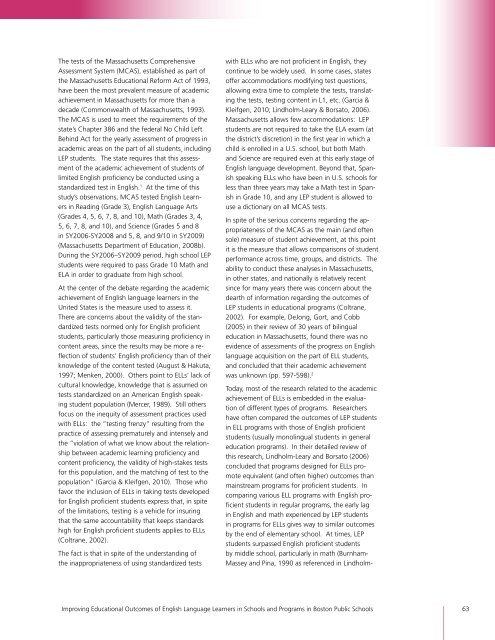Full Report - Center for Collaborative Education
Full Report - Center for Collaborative Education
Full Report - Center for Collaborative Education
You also want an ePaper? Increase the reach of your titles
YUMPU automatically turns print PDFs into web optimized ePapers that Google loves.
The tests of the Massachusetts Comprehensive<br />
Assessment System (MCAS), established as part of<br />
the Massachusetts <strong>Education</strong>al Re<strong>for</strong>m Act of 1993,<br />
have been the most prevalent measure of academic<br />
achievement in Massachusetts <strong>for</strong> more than a<br />
decade (Commonwealth of Massachusetts, 1993).<br />
The MCAS is used to meet the requirements of the<br />
state’s Chapter 386 and the federal No Child Left<br />
Behind Act <strong>for</strong> the yearly assessment of progress in<br />
academic areas on the part of all students¸ including<br />
LEP students. The state requires that this assessment<br />
of the academic achievement of students of<br />
limited English proficiency be conducted using a<br />
standardized test in English. 1 At the time of this<br />
study’s observations, MCAS tested English Learners<br />
in Reading (Grade 3), English Language Arts<br />
(Grades 4, 5, 6, 7, 8, and 10), Math (Grades 3, 4,<br />
5, 6, 7, 8, and 10), and Science (Grades 5 and 8<br />
in SY2006-SY2008 and 5, 8, and 9/10 in SY2009)<br />
(Massachusetts Department of <strong>Education</strong>, 2008b).<br />
During the SY2006–SY2009 period, high school LEP<br />
students were required to pass Grade 10 Math and<br />
ELA in order to graduate from high school.<br />
At the center of the debate regarding the academic<br />
achievement of English language learners in the<br />
United States is the measure used to assess it.<br />
There are concerns about the validity of the standardized<br />
tests normed only <strong>for</strong> English proficient<br />
students, particularly those measuring proficiency in<br />
content areas, since the results may be more a reflection<br />
of students’ English proficiency than of their<br />
knowledge of the content tested (August & Hakuta,<br />
1997; Menken, 2000). Others point to ELLs’ lack of<br />
cultural knowledge, knowledge that is assumed on<br />
tests standardized on an American English speaking<br />
student population (Mercer, 1989). Still others<br />
focus on the inequity of assessment practices used<br />
with ELLs: the “testing frenzy” resulting from the<br />
practice of assessing prematurely and intensely and<br />
the “violation of what we know about the relationship<br />
between academic learning proficiency and<br />
content proficiency, the validity of high-stakes tests<br />
<strong>for</strong> this population, and the matching of test to the<br />
population” (Garcia & Kleifgen, 2010). Those who<br />
favor the inclusion of ELLs in taking tests developed<br />
<strong>for</strong> English proficient students express that, in spite<br />
of the limitations, testing is a vehicle <strong>for</strong> insuring<br />
that the same accountability that keeps standards<br />
high <strong>for</strong> English proficient students applies to ELLs<br />
(Coltrane, 2002).<br />
The fact is that in spite of the understanding of<br />
the inappropriateness of using standardized tests<br />
with ELLs who are not proficient in English, they<br />
continue to be widely used. In some cases, states<br />
offer accommodations modifying test questions,<br />
allowing extra time to complete the tests, translating<br />
the tests, testing content in L1, etc. (Garcia &<br />
Kleifgen, 2010; Lindholm-Leary & Borsato, 2006).<br />
Massachusetts allows few accommodations: LEP<br />
students are not required to take the ELA exam (at<br />
the district’s discretion) in the first year in which a<br />
child is enrolled in a U.S. school, but both Math<br />
and Science are required even at this early stage of<br />
English language development. Beyond that, Spanish<br />
speaking ELLs who have been in U.S. schools <strong>for</strong><br />
less than three years may take a Math test in Spanish<br />
in Grade 10, and any LEP student is allowed to<br />
use a dictionary on all MCAS tests.<br />
In spite of the serious concerns regarding the appropriateness<br />
of the MCAS as the main (and often<br />
sole) measure of student achievement, at this point<br />
it is the measure that allows comparisons of student<br />
per<strong>for</strong>mance across time, groups, and districts. The<br />
ability to conduct these analyses in Massachusetts,<br />
in other states, and nationally is relatively recent<br />
since <strong>for</strong> many years there was concern about the<br />
dearth of in<strong>for</strong>mation regarding the outcomes of<br />
LEP students in educational programs (Coltrane,<br />
2002). For example, DeJong, Gort, and Cobb<br />
(2005) in their review of 30 years of bilingual<br />
education in Massachusetts, found there was no<br />
evidence of assessments of the progress on English<br />
language acquisition on the part of ELL students,<br />
and concluded that their academic achievement<br />
was unknown (pp. 597-598). 2<br />
Today, most of the research related to the academic<br />
achievement of ELLs is embedded in the evaluation<br />
of different types of programs. Researchers<br />
have often compared the outcomes of LEP students<br />
in ELL programs with those of English proficient<br />
students (usually monolingual students in general<br />
education programs). In their detailed review of<br />
this research, Lindholm-Leary and Borsato (2006)<br />
concluded that programs designed <strong>for</strong> ELLs promote<br />
equivalent (and often higher) outcomes than<br />
mainstream programs <strong>for</strong> proficient students. In<br />
comparing various ELL programs with English proficient<br />
students in regular programs, the early lag<br />
in English and math experienced by LEP students<br />
in programs <strong>for</strong> ELLs gives way to similar outcomes<br />
by the end of elementary school. At times, LEP<br />
students surpassed English proficient students<br />
by middle school, particularly in math (Burnham-<br />
Massey and Pina, 1990 as referenced in Lindholm-<br />
Improving <strong>Education</strong>al Outcomes of English Language Learners in Schools and Programs in Boston Public Schools 63


